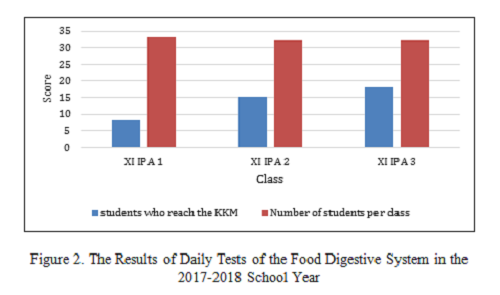
Development of Student Worksheets Based on Scientific Literacy in the Food Digestion System Subject of Class XI Science High School
Abstract
This study aims to develop student worksheets (LKPD) based on scientific literacy on the digestive system subject of class XI IPA high school. The small group test was conducted at SMAN 4 Dumai, because the LKPD used so far had not been based on scientific literacy so the scientific literacy ability of students was still low. This type of research was a research and development model of Borg and Gall. The validity instruments were the RPP, the LKPD, and the question validation sheets. The practicality instrument was a questionnaire of teacher and student responses. The validator consists of 2 lecturers (subject and education experts) and 2 teachers (practitioners). The data obtained is qualitative data converted to quantitative data. RPP validation results from 7 aspects of 3.8 (valid). LKPD validation of 3.77 (valid) includes content aspects of 3.92, linguistic 3.63, content 3.67, and characteristics of 3.85. LKPD is classified as practical after being tested on 15 class XII science students who have received food digestion subject before. The results of the response of students by 3.51 from 3 aspects, namely subject, language and presentation. The results of teacher responses amounted to 3.77. It can be concluded that the LKPD developed is feasible and practically used in the learning process.
Keywords
Full Text:
PDFReferences
Afdareza, M.Y., Yuanita, P., & Maimunah. (2020). Development of Learning Device Based on 21st Century Skill with Implementation of Problem Based Learning to Increase Critical Thinking Skill of Students on Polyhedron for Grade 8th Junior High School. Journal of Educational Sciences, 4(2), 273-284.
Anidityas, N.A et al,. (2012). Penggunaan Alat Peraga Sistem Pernafasan Manusia Pada Kualitas Belajar Siswa SMP Kelas VIII. Unnes Science Education Journal. 1 (2).
Ardianto, Susilawati & Rasmiwetti. (2019). Development of Chemical Handout Based in Guided Inquiry in Supply Solution Materials in SMA/MA. Journal of Educational Sciences, 3(3), 364-376.
Chiapetta, Eugene L et al,. (1993). Do Middle School Life Science Textbooks Provide a Balance of Scientific Literacy Themes?. Journal of Research In Science Teaching 30 (7), 787-797.
Eriyandi, V., Suriani, C. (2018). Analisis tingkat literasi sains buku teks biologi kelas XI pada materi sistem saraf di sma se-kecamatan Pancurbatu tahun pembelajaran 2016/2017. Jurnal pelita pendidikan, 6 (1), 007 – 012
Fitri, Ramadhani, Ramadhan & Yuni A. (2014). Pengembangan Lembar Kerja Siswa Biologi berorientasi Pendekatan Kontekstual pada Materi Pewarisan Sifat untuk Kelas IX. Ejournal.unp.ac.id. 5 (1).
Kemendikbud. (2016). Peringkat dan Capaian PISA Indonesia Mengalami Peningkatan 06 Desember 2016. https://www.kemdikbud.go.id/.diakses 1 januari 2018.
Lufri, Laili, F. & Anhar, A. (2020). Effect of Active Learning in Form of Scientific Approach with Assistance of Student Worksheets Based Problem Based Learning (PBL) Towards Students' Biology Psychomotor Competence in Bacterial Material. Journal of Educational Sciences, 4(1), 20-29.
Muldayanti, N.D. 2013 Pembelajaran Biologi Model STAD dan TGT ditinjau dari Keingintahuan dan minat belajar siswa. Jurnal Pendidikan IPA Indonesia, 2 (1).
OECD. (2016). PISA 2015 Assessment and Analytical Framework: Science, Reading, Mathematic and Financial Literacy. PISA, OECD Publishing, Paris.
OECD. (2016). Country Note, Programme for International Student Assessment (PISA) Result from PISA 2015. https://www.oecd.org/pisa/PISA-2015-Indonesia.pdf. Diakses 1 januari 2018
Rusilowati, Ani. (2014). Analisis buku ajar ipa yang digunakan di semarang berdasarkan muatan literasi sains. Proceeding seminar nasional konservasi dan kualitas pendidikan.
Sudarisman, S. (2015). Memahami Hakikat Dan Karakteristik Pembelajaran Biologi Dalam Upaya Menjawab Tantangan Abad 21 Serta Optimalisasi Implementasi Kurikulum 2013. Jurnal Florea Volume 2 No. 1, April 2015 (29-35).
Sugiyono. (2016). Metode Penelitian Kuantitatif Kualitatif dan R & D. Bandung: Alfabeta.
Sukini, Syafii, W., & Yustina (2020). The Influence of Guided Inquiry Learning Model Using Thinking Empowering by Questioning (Teq) on Results of Biology Learning for High School Students. Journal of Educational Sciences, 4(1), 153-163.
Syafaren, A., Yustina, Mahadi, I. & Vebrianto, R. (2019). Increasing Critical Thinking Skills Through Natural Science Learning Based on the Integration of Guided Inquiry with Numbered Heads Together (NHT). Journal of Educational Sciences, 3(3), 433-444.
Untari S, et al. (2008). Pengembangan bahan ajar dan lembar kegiatan siswa mata pelajaran PPKN dengan pendekatan deep dialoque/critical thinking utk meningkatkan kemampuan berdialog dan berfikir kritis siswa SMA di jatim. Jurnal penelitian pendidikan 18 (1), 154-177
Velda, Almira., et al,. (2012). Pengembangan Lembar Kegiatan Peserta Didik (LKPD) pada Materi Pokok Eubacteria Berbasis Pendekatan Ilmiah. Jurnal Pelita Pendidikan 5 (3), 330-338.
Wahyu, E, Fathurohman & Sardianto. (2016). Analisis Buku Siswa Mata Pelajaran IPA Kelas VIII SMP/MTS Berdasarkan Kategori Literasi Sains. Jurnal Inovasi dan Pembelajaran Fisika 3 (2).
Wulandari., N. (2017). Penyusunan Lembar Kerja Siswa (LKS) sebagai Panduan Belajar untuk maeri sistem Regulasi Pada Sub materi sistem Indra di SMA Kelas XI Semester II. Universitas Negeri Yogyakarta. Thesis
DOI: http://dx.doi.org/10.31258/jes.4.4.p.735-747
Refbacks
- There are currently no refbacks.
Copyright (c) 2020 Siti Hafsah Harahap, Wan Syafi’i, Sri Wulandari

This work is licensed under a Creative Commons Attribution 4.0 International License.
Publisher: FKIP Universitas Riau












